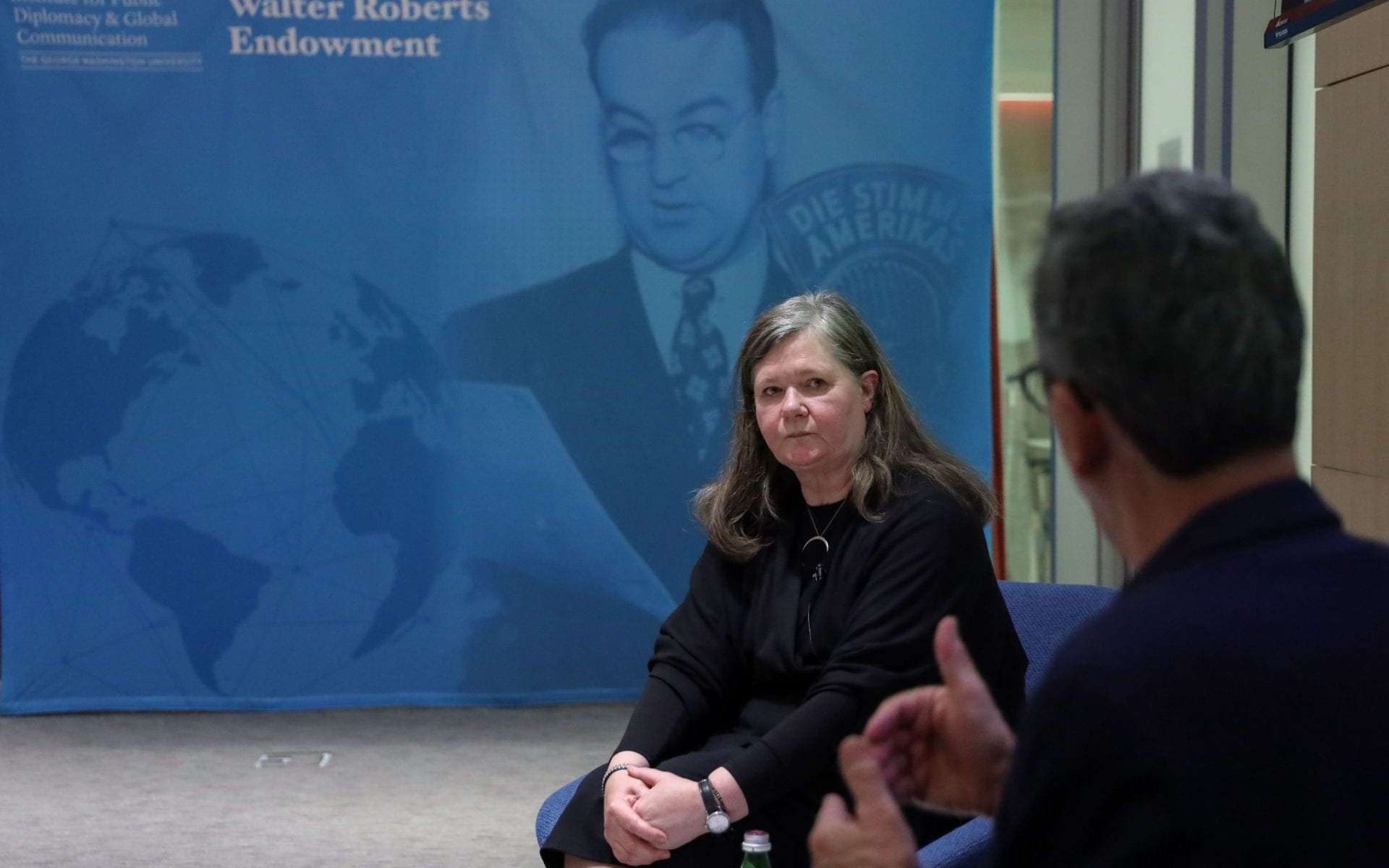[et_pb_section fb_built=”1″ _builder_version=”4.16″ global_colors_info=”{}”][et_pb_row _builder_version=”4.16″ background_size=”initial” background_position=”top_left” background_repeat=”repeat” global_colors_info=”{}” min_height=”2321.8px”][et_pb_column type=”4_4″ _builder_version=”4.16″ custom_padding=”|||” global_colors_info=”{}” custom_padding__hover=”|||”][et_pb_text _builder_version=”4.16″ background_size=”initial” background_position=”top_left” background_repeat=”repeat” global_colors_info=”{}”]
The fifth of IPDGC’s monthly series hosting international ambassadors to learn about their country’s approach to public diplomacy.
Date and Time
Monday, March 3rd 2025
5:00 – 6:00 PM ET
Address
School of Media and Public Affairs
5th Floor Studio
805 21st St NW, Washington DC 20052
Snacks and refreshments will be provided
* Doors will close at 5pm
The series will explore two related themes:
- Savvy diplomats understand that to succeed in advancing foreign policy goals in Washington it is not enough to communicate in strictly government-to-government channels; they must act as public diplomats, engaging a range of audiences to influence perceptions. The interplay between public diplomacy actions and policy goals is frequently addressed from a U.S. government perspective, or in treating foreign governments’ actions in a third country setting, but this series explores Embassies’ engagement with the U.S. public.
- What does it take to be an Ambassador assigned by your government to Washington, DC? What sort of personality, background, and skills are required? Once assigned, how does an Ambassador prepare for their assignment, and once here, how do they continue a process of learning about their country of assignment? Most importantly, how does an Ambassador assigned to Washington connect with America outside the beltway? If every savvy diplomat is a public diplomat, then how do Ambassadors remain connected with the broader American public?
About Our Speaker
Pjer Šimunović is Croatia’s Ambassador to the United States since September 2017. Before assuming his Ambassadorship, together with a career in international affairs journalism and academic research he served in various high-level positions in the Croatian Government, in the fields of national security, defense and diplomacy.
He was Director of the Office of the National Security Council, Ambassador to Israel, Defense State Secretary in charge of defense policy, National Coordinator for NATO and Assistant Foreign Minister, heading Division for International Organizations and Security, Political Counselor at the Embassy in Paris, and Deputy Director of Analytical Department in the Foreign Ministry. During his career in journalism, he worked with the BBC World Service in London, with the magazine Europ in Paris, and with the Croatian daily ‘Večernji list’ in Zagreb, covering the collapse of Communism, crisis and war in the former Yugoslavia, and European and Transatlantic affairs.
A regular speaker on the security issues at many international conferences and seminars, he is the author of a range of studies and articles published in the leading international journals, dealing with the arms trade and defense industry, post-Communist national security, NATO enlargement, defense transformation, international peace-keeping and stabilization operations, counter-terrorism (including: ‘Making of an Ally – NATO membership conditionality implemented on Croatia’, The Journal of Transatlantic Studies, Spring 2015; ‘A framework for success – contextual factors in the UNTAES operation in Eastern Slavonia’, International Peacekeeping, Spring 1999; ‘The Russian military in Chechnya – a case study of morale in war’, The Journal of Slavic Military Studies, March 1998).
Ambassador Šimunović holds an M.A. degree from the Department of War Studies, King’s College London, and a B.A, degree in the Comparative Literature and Italian Language and Literature from the University of Zagreb. He is born in Split, Croatia, in 1962. Ambassador Šimunović is decorated with the title of Chevalier de la Légion d’honneur de la République française.
Read more about the event and RSVP here.
[/et_pb_text][/et_pb_column][/et_pb_row][/et_pb_section][et_pb_section fb_built=”1″ fullwidth=”on” theme_builder_area=”post_content” _builder_version=”4.27.4″ _module_preset=”default”][et_pb_fullwidth_image src=”https://blogs.gwu.edu/ipdgc-build/files/2025/03/DSC_2028.jpg” _builder_version=”4.27.4″ _module_preset=”default” theme_builder_area=”post_content” title_text=”DSC_2028″ hover_enabled=”0″ sticky_enabled=”0″][/et_pb_fullwidth_image][et_pb_fullwidth_image src=”https://blogs.gwu.edu/ipdgc-build/files/2025/03/DSC_2013.jpg” _builder_version=”4.27.4″ _module_preset=”default” theme_builder_area=”post_content” title_text=”DSC_2013″ hover_enabled=”0″ sticky_enabled=”0″][/et_pb_fullwidth_image][et_pb_fullwidth_image src=”https://blogs.gwu.edu/ipdgc-build/files/2025/03/DSC_2018.jpg” _builder_version=”4.27.4″ _module_preset=”default” theme_builder_area=”post_content” title_text=”DSC_2018″ hover_enabled=”0″ sticky_enabled=”0″][/et_pb_fullwidth_image][et_pb_fullwidth_image src=”https://blogs.gwu.edu/ipdgc-build/files/2025/03/DSC_2016.jpg” _builder_version=”4.27.4″ _module_preset=”default” theme_builder_area=”post_content” title_text=”DSC_2016″ hover_enabled=”0″ sticky_enabled=”0″][/et_pb_fullwidth_image][et_pb_fullwidth_image src=”https://blogs.gwu.edu/ipdgc-build/files/2025/03/DSC_2007.jpg” _builder_version=”4.27.4″ _module_preset=”default” theme_builder_area=”post_content” title_text=”DSC_2007″ hover_enabled=”0″ sticky_enabled=”0″][/et_pb_fullwidth_image][/et_pb_section]







